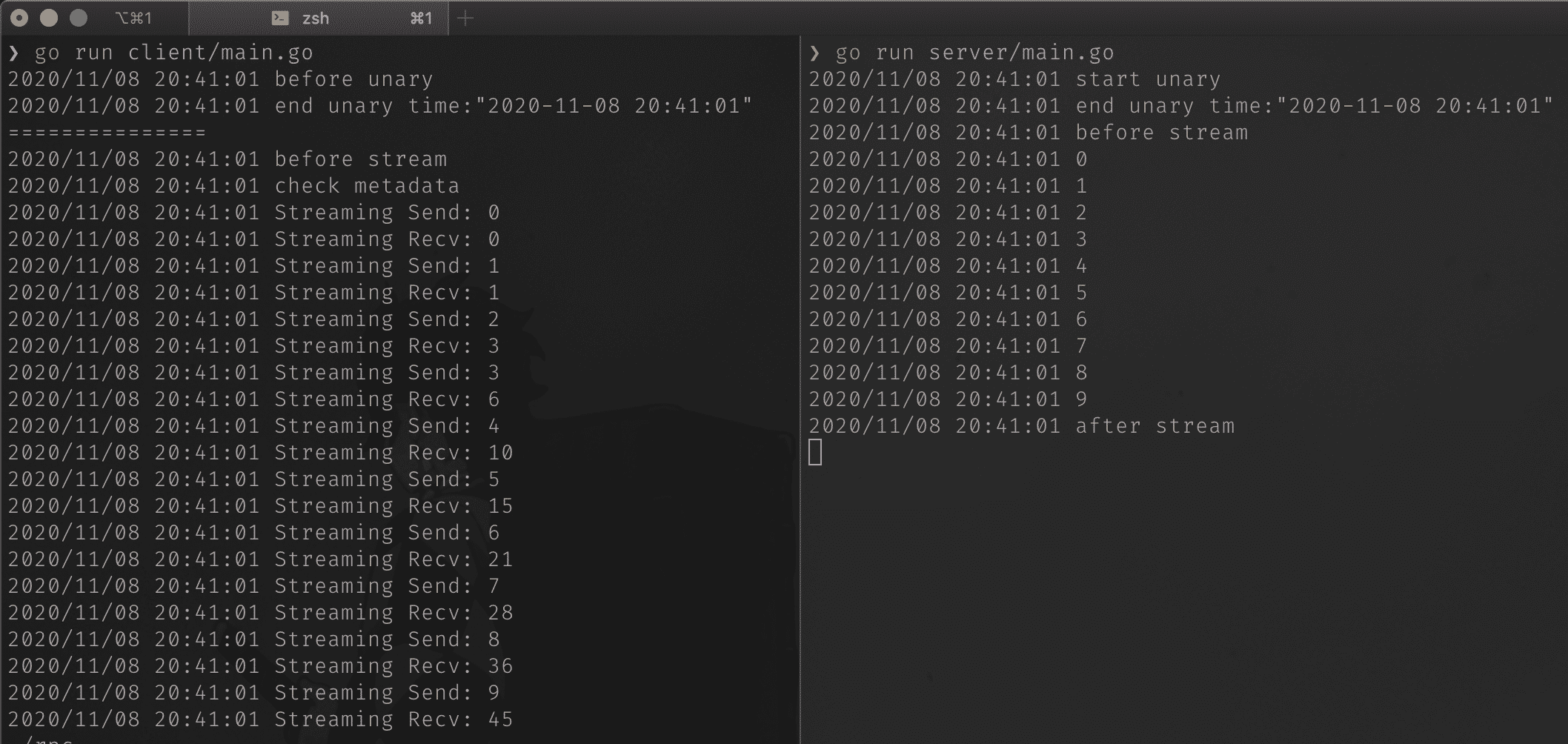在Web服务中,除了实际的业务代码,经常还需要实现统一记录请求日志,权限管理或异常处理等功能,这些在web框架Gin或Django中可通过middleware实现,而gRPC中则可使用interceptor,对rpc请求或响应进行拦截处理。
gRPC服务端跟客户端均可实现各自的拦截器,根据rpc的两种请求方式可分为两种。
- Unary Interceptor(一元拦截器)
- Stream Interceptor(流式拦截器)
一元拦截器
对于一元服务器拦截器,只需要定义UnaryServerInterceptor方法即可,其中,handler(ctx, req)即调用rpc方法。
1
2
3
4
5
6
7
8
| type UnaryServerInterceptor func(
ctx context.Context, // rpc上下文
req interface{}, // rpc请求参数
info *UnaryServerInfo, // rpc方法信息
handler UnaryHandler // rpc方法本身
) (interface{}, error){
return handler(ctx, req)
}
|
而对于一元客户端拦截器,一样需要定义一个方法UnaryClientInterceptor,其中执行invoker()才真正请求rpc。
1
2
3
4
5
6
7
8
9
10
11
| type UnaryClientInterceptor func(
ctx context.Context, // rpc上下文
method string, // 调用方法名
req, // rpc请求参数
reply interface{}, // rpc响应结果
cc *ClientConn, // 连接句柄
invoker UnaryInvoker, // 调用rpc方法本身
opts ...CallOption // 调用配置
) error {
return invoker(ctx, method, req, reply, cc, opts...)
}
|
一元拦截器的实现,根据调用handler或invoker的前后,可分为三部分:调用前预处理,调用rpc方法,调用后处理。
流式拦截器
流式拦截器的实现,与一元拦截器一致,实现提供的方法即可,方法参数含义如下:
1
2
3
4
5
6
7
8
| type StreamServerInterceptor func(
srv interface{}, // rpc请求参数
ss ServerStream, // 服务端stream对象
info *StreamServerInfo, // rpc方法信息
handler StreamHandler // rpc方法本身
) (err error){
return handler(src, ss)
}
|
1
2
3
4
5
6
7
8
9
10
11
12
13
| type StreamClientInterceptor func(
ctx context.Context, // rpc上下文
desc *StreamDesc, // 流信息
cc *ClientConn, // 连接句柄
method string, // 调用方法名
streamer Streamer, // 调用rpc方法本身
opts ...CallOption // 调用配置
)(ClientStream, error){
clientStream, err := streamer(ctx, desc, cc, method, opts...)
return clientStream, err
}
|
与其他拦截器不同,客户端流式拦截器的实现分为两部分,流操作预处理和流操作拦截,其不能在事后进行rpc方法调用和后处理,只能通过ClientStream对象进行流操作拦截,例如根据特定的metadata,调用ClientStream.CloseSend()终止流操作。
举个例子
这里我们将上述四种拦截器都写一个简单输出请求日志的demo,看看实际效果
demo目录结构如下
1
2
3
4
5
6
7
8
9
10
11
| rpc
├── base.proto
├── base
│ ├── base.pb.go
│ └── base_grpc.pb.go
├── client
│ └── main.go
├── server
│ └── main.go
├── go.mod
├── go.sum
|
base.proto文件如下
1
2
3
4
5
6
7
8
9
10
11
12
13
14
15
16
17
18
19
20
21
22
23
24
25
| syntax = "proto3";
package proto;
option go_package = "base;base";
service BaseService {
rpc GetTime (TimeRequest) returns (TimeResponse){}
rpc Streaming (stream StreamRequest) returns (stream StreamResponse){}
}
message TimeRequest {}
message TimeResponse {
string time = 1;
}
message StreamRequest{
string input = 1;
}
message StreamResponse{
string output = 1;
}
|
执行命令protoc --go_out=. --go-grpc_out=. base.prto生成对应的pb文件。
server.go
1
2
3
4
5
6
7
8
9
10
11
12
13
14
15
16
17
18
19
20
21
22
23
24
25
26
27
28
29
30
31
32
33
34
35
36
37
38
39
40
41
42
43
44
45
46
47
48
49
50
51
52
53
54
55
56
57
58
59
60
61
62
63
64
65
66
| package main
import (
"context"
"log"
"io"
"net"
"strconv"
"time"
pb "rpc/base"
"google.golang.org/grpc"
"google.golang.org/grpc/reflection"
)
type service struct {
pb.UnimplementedBaseServiceServer
}
func main() {
listen, err := net.Listen("tcp", ":50051")
if err != nil {
fmt.Println(err)
}
s := grpc.NewServer(grpc.UnaryInterceptor(UnaryServerInterceptor), grpc.StreamInterceptor(StreamServerInterceptor))
reflection.Register(s)
pb.RegisterBaseServiceServer(s, &service{})
s.Serve(listen)
}
func UnaryServerInterceptor(ctx context.Context, req interface{}, info *grpc.UnaryServerInfo, handler grpc.UnaryHandler) (resp interface{}, err error) {
log.Println("start unary")
resp, err = handler(ctx, req)
log.Printf("end unary %v\n", resp)
return resp, err
}
func StreamServerInterceptor(srv interface{}, ss grpc.ServerStream, info *grpc.StreamServerInfo, handler grpc.StreamHandler) error {
log.Println("before stream")
err := handler(srv, ss)
log.Println("after stream")
return err
}
func (s *service) GetTime(ctx context.Context, in *pb.TimeRequest) (*pb.TimeResponse, error) {
now := time.Now().Format("2006-01-02 15:04:05")
return &pb.TimeResponse{Time: now}, nil
}
func (s *service) Streaming(stream pb.BaseService_StreamingServer) error {
for n := 0; ; {
res, err := stream.Recv()
if err == io.EOF {
return nil
}
if err != nil {
return err
}
v, _ := strconv.Atoi(res.Input)
log.Println(v)
n += v
stream.Send(&pb.StreamResponse{Output: strconv.Itoa(n)})
}
}
|
client.go
1
2
3
4
5
6
7
8
9
10
11
12
13
14
15
16
17
18
19
20
21
22
23
24
25
26
27
28
29
30
31
32
33
34
35
36
37
38
39
40
41
42
43
44
45
46
47
48
49
50
51
52
53
54
55
56
57
58
59
60
61
62
63
64
65
| package main
import (
"context"
"io"
"log"
"strconv"
pb "rpc/base"
"google.golang.org/grpc"
)
func main() {
conn, err := grpc.Dial(":50051", grpc.WithInsecure(), grpc.WithBlock(), grpc.WithUnaryInterceptor(UnaryClientInterceptor), grpc.WithStreamInterceptor(StreamClientInterceptor))
if err != nil {
log.Println(err)
}
defer conn.Close()
c := pb.NewBaseServiceClient(conn)
_, err = c.GetTime(context.Background(), &pb.TimeRequest{})
if err != nil {
log.Fatal(err)
}
print("===============\n")
streaming(c)
}
func UnaryClientInterceptor(ctx context.Context, method string, req, reply interface{}, cc *grpc.ClientConn, invoker grpc.UnaryInvoker, opts ...grpc.CallOption) error {
log.Println("before unary")
err := invoker(ctx, method, req, reply, cc, opts...)
log.Printf("end unary %v\n", reply)
return err
}
func StreamClientInterceptor(ctx context.Context, desc *grpc.StreamDesc, cc *grpc.ClientConn, method string, streamer grpc.Streamer, opts ...grpc.CallOption) (grpc.ClientStream, error) {
log.Println("before stream")
clientStream, err := streamer(ctx, desc, cc, method, opts...)
log.Println("check metadata")
return clientStream, err
}
func streaming(client pb.BaseServiceClient) error {
stream, _ := client.Streaming(context.Background())
for n := 0; n < 10; n++ {
log.Println("Streaming Send:", n)
err := stream.Send(&pb.StreamRequest{Input: strconv.Itoa(n)})
if err != nil {
return err
}
res, err := stream.Recv()
if err == io.EOF {
break
}
if err != nil {
return err
}
log.Println("Streaming Recv:", res.Output)
}
stream.CloseSend()
return nil
}
|
rpc目录下依次执行go run server/main.go 和 go run client/main.go,输出效果如下

可以明显看出StreamClientInterceptor则是在流处理开始时就输出了两次日志,其余三种拦截器则在请求前后输出两次。
小结
如果需要使用多个拦截器,grpc-go中提供了相应的四种链接器
grpc.ChainUnaryInterceptor(i ...UnaryServerInterceptor)grpc.ChainStreamInterceptor(i ...StreamServerInterceptor)grpc.WithChainUnaryInterceptor(i ...UnaryClientInterceptor)grpc.WithChainStreamInterceptor(i ...StreamClientInterceptor)
如果grpc版本过老,可能还未提供chain api,可以使用第三方库grpc-ecosystem/go-grpc-middleware。除了链接器,库中还提供了许多常用的拦截器,例如grpc_zap,grpc_recovery等。当然,特殊需求也可以通过实现对应方法,实现自定义interceptor。
